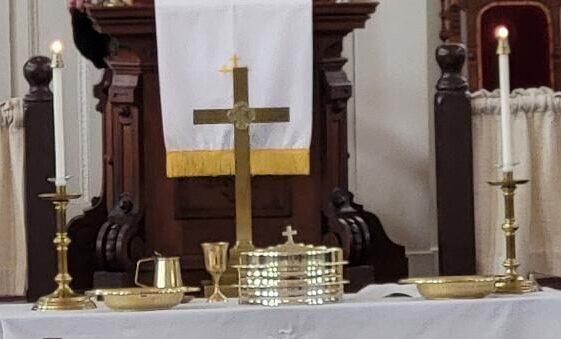Sermon Sunday February 2, 2025
Rev. Norman A. Michaud
“Called or Not”
Luke 4: 21-30
Jeremiah 1: 4-10
“Let the words of my mouth and the meditation of my heart be acceptable to you, O Lord, my rock and my redeemer.”
This Sunday is the fourth Sunday of Epiphany. Love is our Call.
I have a personal connection to Jeremiah’s Call. We all have childhood memories. Some memories will fade, some remain on the tips of our tongues, and some will be remembered when provoked. Some recollections we want to forget, others we cherish. One thing for sure is that the concept and recognition of “Call” should allow us to accept our gifts or talents and use those gifts to fulfill one’s life.
So, how do today’s followers of God, the Holy Spirit, and Christ understand the uncompromising nature of God’s Call to Jeremiah? Two propositions may be offered as food for thought. First, some people are so completely connected with what they do in life that their function, their vocation, is an essential expression of their inner being. Second, all can nourish and grow their gifts in the service of God’s people.
I want to share my story with you, which echoes the call experience. These echoes bring to mind the sense of Call each of us may hear.
I love the scriptures offered for this Sunday. Both are beautiful and powerful. Jeremiah’s Call has a personal connection and is connected to a moment. I was a church member in Portsmouth, New Hampshire, North Church, from baptism until nearly a year after I went to Denver to attend Iliff School of Theology in 2013. That is quite a run. By 2009 had become very active at North Church and was asked to serve as a deacon. I was humbled and honored, as was my mother and her grandfather. A circle of service had closed with my privilege of serving as a deacon at that same church.
In 2011, I committed to becoming a minister at the United Church of Christ. I made this declaration with great trepidation to my pastor, Rev. Dawn Shippee. I spoke with her, hoping she would tell me I was daft. Instead, she set my keel and sails. She expressed delight. Time and circumstance would settle the details. I began to devise a plan. That plan did not include Iliff School of Theology in Denver. I did not know what plan, time, or place would be revealed in God’s plan. I just trusted in faith that as long as I did the next right thing to achieve ordination in the UCC, I would fulfill what I came to believe was my Call.
On the last Sunday I served North Church as a Deacon, Rev. Shippee cornered me and asked me to read the scripture that morning. It was on a single page, typed in 14-point font, and it was Jeremiah’s Call, the same scripture that was read today. I stood to read in that high, old-fashioned pulpit, and my voice quaked a bit. Rev. Shippee thought this was an appropriate congregation’s goodbye to me. I was filled with memories and faith. After the service, several folks who knew and remembered my mother fondly clasped my hands at the church door and told me that this was always to be my providence; they knew it for decades. That was news to me, but it was welcome news. One said it was simply a matter of whether or not I would listen and when I would heed my Call. And since I did, I have borne in God’s current and come to First Millbury Congregational church.
All of us might not have a specific call story, but sharing our gifts and talents, welcoming others, and showing kindness in the world are all part of the idea of CALL. By these acts, we live into who God wants us to be, who we are called to be.
Jesus was called to serve not a single synagogue but All people. It’s helpful to remember that Jesus would be arrested and executed because he threatened the Peace of Rome and the power of the puppet government installed to serve Rome’s objectives. Rome only cared about profits, not prophets like Isaiah, Jeremiah, or John the Baptist. Rome oppressed people by taking money to support the empire. The point of scripture isn’t always to make us feel good. Communities of faith and their leaders cannot always meet our expectations, partially because they are human. People make mistakes. Jesus says in Nazareth that day, “No prophet is accepted in the prophet’s hometown.” I provided a prequel of today’s scripture last Sunday.
Luke 4: 21 Then he began to say to them, “Today, this scripture has been fulfilled in your hearing.” 24 He said, “Truly I tell you, no prophet is accepted in his hometown.”
But Jesus does not stop there. He goes on. Jesus reminds his hometown congregation of the Prophet Elijah, who only attended to a foreigner’s widow during a three-year and a half year famine. Jesus then invokes Elisha, who, while many suffered from skin disease, only cleansed Naaman, the Syrian. The people of Nazareth probably haven’t forgotten: Naaman was also an enemy army commander. The Prophets provided mercy and healing to these people even though they were foreigners beyond the rule of the laws of Israel.
Luke 4: 28 When they heard this, all in the synagogue were filled with rage. 29 They got up, drove him out of the town, and led him to the brow of the hill on which their town was built, so that they might hurl him off the cliff. 30 But he passed through the midst of them and went on his way.”
Jesus’ words sting his audience. No wonder the people of Nazareth want to throw him off a cliff.
There isn’t a cliff in Nazareth. When one visits the Holy Land and asks to see the place where this happened, they will take you to a gentle slope. Don’t get me wrong, I wouldn’t want to get rolled down a hill, but still—the people in the Nazarene synagogue thought Jesus should be tossed down that slope. If Christ’s mercy extends to our perceived enemies, how can he be for us?
Jesus escapes—if not certain death, then at least specific bruising—but how? Luke includes a tantalizing detail: Jesus goes through “the middle.” He refuses to be caught in the binary trap. He is not pro-Jew or anti-Samaritan. He’s not pro-Capernaum and anti-Nazareth. He won’t be pinned down as a political party or football team supporter. Jesus’ message won’t be contained or restrained by his people.
Jesus came to be with us, whoever we are. This is so important because, at some time or another, we will find ourselves on the wrong side of a dividing line. Our gender, our age, our race or color, who we love, how much money we make, our physical abilities or challenges, our nationality, where we went to school, how we pray—these will make us unworthy in the eyes of some. Someone once said that whenever the world draws a line, Jesus walks across to the other side. His love is just that big.


